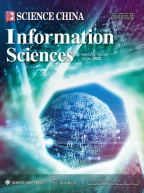Abstract
The performance of modern conflict-driven clause learning (CDCL) SAT solvers strongly depends on branching heuristics. State-of-the-art branching heuristics, such as variable state independent decaying sum (VSIDS) and learning rate branching (LRB), are computed and maintained by aggregating the occurrences of the variables in conflicts. However, these heuristics are not sufficiently accurate at the beginning of the search because they are based on very few conflicts. We propose the distance branching heuristic, which, given a conflict, constructs a complete implication graph and increments the score of a variable considering the longest distance between the variable and the conflict rather than the simple presence of the variable in the graph. We implemented the proposed distance branching heuristic in Maple_LCM and Glucose-3.0, two of the best CDCL SAT solvers, and used the resulting solvers to solve instances from the application and crafted tracks of the 2014 and 2016 SAT competitions and the main track of the 2017 SAT competition. The empirical results demonstrate that using the proposed distance branching heuristic in the initialization phase of Maple_LCM and Glucose-3.0 solvers improves performance. The Maple_LCM solver with the proposed distance branching heuristic in the initialization phase won the main track of the 2017 SAT competition.
Similar content being viewed by others
References
Audemard G, Simon L. Glucose 2.3 in the SAT 2013 competition. In: Proceedings of SAT Competition, 2013. 42–43
Biere A. Lingeling, Plingeling, Picosat and Precosat at SAT Race 2010. FMV Report Series, Technical Report 10/1, 2010
Eén N, Sorensson N. An extensible SAT solver. In: Proceedings of SAT, 2003. 502–518
Marques-Silva J, Sakallah K A. GRASP — a new search algorithm for satisfiability. In: Proceedings of the International Conference on Computer-Aided Design, 1996. 220–227
Moskewicz M, Madigan C, Zhao Y, et al. Chaff: engineering an efficient SAT solver. In: Proceedings of the Design Automation Conference, 2001. 530–535
Soos M. CryptoMiniSat v4. In: Proceedings of SAT Competition, 2014. 23
Marques-Silva J, Lynce I, Malik S. Conflict-driven clause learning SAT solvers. In: Handbook of Satisfiability. Washington: IOS Press, 2009. 131–153
Liang J H, Ganesh V, Poupart P, et al. Exponential recency weighted average branching heuristic for SAT solvers. In: Proceedings of AAAI, 2016. 3434–3440
Audemard G, Simon L. Predicting learnt clauses quality in modern SAT solvers. In: Proceedings of IJCAI, 2009. 399–404
Luo M, Li C M, Xiao F, et al. An effective learnt clause minimization approach for CDCL SAT solvers. In: Proceedings of IJCAI, 2017. 703–711
Xiao F, Luo M, Li C M, et al. MapleLRB LCM, Maple_LCM, Maple_LCM_Dist, MapleLRB_LCMoccRestart and Glucose-3.0+width in SAT Competition 2017. In: Proceedings of SAT Competition, 2017. 22–23
Audemard G, Simon L. Refining restarts strategies for SAT and UNSAT. In: Proceedings of International Conference on Principles and Practice of Constraint Programming, 2012. 118–126
Biere A, Förhlich A. Evaluating CDCL variable scoring schemes. In: Proceedings of SAT, 2015. 405–422
Goldberg E, Novikov Y. BerkMin: a fast and robust Sat-solver. Discrete Appl Math, 2007, 155: 1549–1561
Jeroslow R G, Wang J. Solving propositional satisfiability problems. Ann Math Artif Intell, 1990, 1: 167–187
Marques-Silva J. The impact of branching heuristics in propositional satisfiability algorithms. In: Proceedings of EPIA, 1999. 850
Audemard G, Simon L. GLUCOSE: a solver that predicts learnt clauses quality. In: Proceedings of SAT Competition, 2009. 7–8
Audemard G, Simon L. Glucose in the SAT 2014 competition. In: Proceedings of SAT Competition, 2014. 31–32
Liang J H, Ganesh V, Poupart P, et al. Learning rate based branching heuristic for SAT solvers. In: Proceedings of SAT, 2016. 123–140
Liang J H, Oh C, Ganesh V, et al. MapleCOMSPS, MapleCOMSPS LRB, MapleCOMSPS CHB. In: Proceedings of SAT Competition, 2016. 52–53
Li C M, Manyá F, Mohamedou N O, et al. Resolution-based lower bounds in MaxSAT. Constraints, 2010, 15: 456–484
Acknowledgements
This work was partially supported by National Natural Science Foundation of China (Grant Nos. 61370183, 61370184, 61472147), Matrics Platform of the Université de Picardie Jules Verne, and MINECO-FEDER Project RASO (Grant No. TIN2015-71799-C2-1-P).
Author information
Authors and Affiliations
Corresponding author
Rights and permissions
About this article
Cite this article
Xiao, F., Li, CM., Luo, M. et al. A branching heuristic for SAT solvers based on complete implication graphs. Sci. China Inf. Sci. 62, 72103 (2019). https://doi.org/10.1007/s11432-017-9467-7
Received:
Revised:
Accepted:
Published:
DOI: https://doi.org/10.1007/s11432-017-9467-7
